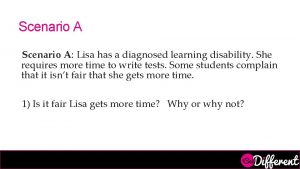Social competence selfassessment of patients diagnosed with depression

- Slides: 1

Social competence self-assessment of patients diagnosed with depression Mirta Vranko¹², Petra Hruškar¹, Irena Velimirović², Petrana Brečić¹ ¹ University Psychiatric Hospital Vrapče, Department of Affective Disorders, Croatia ² University of Zagreb, Faculty of Education and Rehabilitation Sciences, doctoral student INTRODUCTION Social competence is part of emotional intelligence that refers to the effective functioning in the social context. Depressive disorders are often associated with significantly disrupted social functioning. Stump et al. (2009) suggest Dodge's (1985) definition, according to which social competence is a multidimensional construct that includes interpersonal relationships, frequency of interaction, a positive self-concept and social and cognitive skills. In this context it is interesting to reflect on those suffering from depression that actively participate in different social contexts and form a part of urban culture. SAMPLE OBJECTIVES The study was conducted on a sample of 112 patients involved in some form of treatment at the University Psychiatric Hospital Vrapče, during April 2016. The sample consists of 29% men and The aim of this paper is to observe and evaluate social competence of patients diagnosed with depression taking into account their views and perceptions of their own social competence. 85% women. The age range of the respondents is between 23 and 75 (M = 45. 34). The largest percentage of respondents have completed high school (62. 4%), then the following college (17. 9%), and graduated (12%). The smallest percentage of respondents has completed primary METHODOLOGY school (4. 3%), and no educated at all (0. 9%). The most common form of treatment is a sociotherapeutic treatment (57. 3%), while the rest of the respondents are involved in daily treatment (22. 2%), or in acute treatment (20. 5%) Study was conducted during April 2016, and Social Competence Scale (SCS) was used. Scale consists of 67 variables that have been divided into the following categories: RESULTS AND CONCLUSION Respondents achieved relatively low scores in individual categories of social competence, as well as, Anger Control on the overall scale. The lowest results are archieved in categories related to empathy, self – Coping with stress presentation, recognition and expression of emotions, reasoning and expression of dissent, taking responsability. This results suggest the need that individualization of treatment programs can strengthen the level of social functioning of patients. Strengthening social competence can be observed as preconditions for social inclusion and raising the quality of life, therefore it could be strong protective factor in preventing relaps. M SD Min Max The highest lowest possible score Problem solving 16. 12 2. 13 12 21 24 12 Anger control 13. 89 1. 35 11 16 20 10 Coping with stress 4. 38 0. 97 3 6 6 3 Listening 5. 1 2. 08 4 25 8 4 Disagreeing appropriately 5. 73 0. 96 4 8 8 4 Empathy 7. 71 1. 37 6 16 12 6 Self-presentation 4. 18 1. 08 3 6 6 3 Recognition and expression of emotions Disagreeing appropriately Listening Recognition and expression of emotions Reasoning and expression of dissent Empathy Taking responsability Self – presentation Communicative skills Appreciation of diversity Goal setting Problem solving The highest overall score on a SCS that can be achieved is 134, while the lowest is 67. Data are processed in SPSS – 20, using descriptive statistics. REFERENCES Stump et al. (2009). Theories of Social Competence from the Top – Down to the Bottom – Up: A Case for Considering Foundational Human Needs. (in) Matson, J. (2009). Social Behavior and Skills in Children, 23 - 37. New York: Springer - Verlag CONTACT Mirta Vranko, University Psychiatric Hospital Vrapče, mirta. vranko@gmail. com 6. 13 1. 07 5 9 10 5 Petra Hruškar, University Psychiatric Hospital Vrapče, petra. hruskar@yahoo. com Irena Velimirović, University of Zagreb, Faculty for Education and Rehabilitaton Sciences Reasoning and expression of dissent 6. 83 1. 09 5 10 10 5 irenevelimirovic@gmail. com Taking responsability 3. 80 0. 82 3 6 6 3 Petrana Brečić, University Psychiatric Hospital Vrapče, petrana. brecic@bolnica-vrapce. hr Communicative skills 8. 15 1. 10 7 11 14 7 Appreciation of diversity 1. 21 0. 41 1 2 2 1 Goal setting 2. 69 0. 71 2 4 4 2 Social competence totals 86. 96 6. 62 71 103 134 67 RESEARCH POSTER PRESENTATION DESIGN © 2015 www. Poster. Presentations. com Presented on International Symposium „Health for All? ! Mental health”, Rijeka, Croatia, May, 6 th 2016

